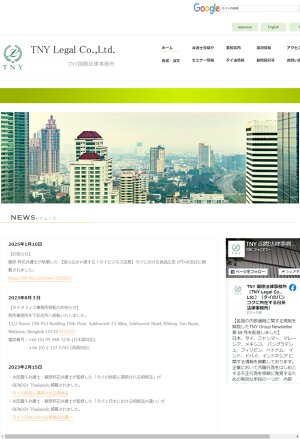Best Public-Private Partnerships (PPP) Lawyers in Bangkok
Share your needs with us, get contacted by law firms.
Free. Takes 2 min.
List of the best lawyers in Bangkok, Thailand
Legal guides written by SIAM LEGAL INTERNATIONAL:
- Defamation Laws in Thailand: Criminal Charges and Civil Suits
- The State of Thailand’s Long-Term Resident (LTR) Visa Program in 2025
- The Penalties Of Not Filing Your Income Tax Return As A Foreigner In Thailand
About Public-Private Partnerships (PPP) Law in Bangkok, Thailand
Public-Private Partnerships (PPPs) in Bangkok, Thailand refer to collaborative arrangements between the government and private sector companies for the delivery of public infrastructure, services, or facilities. These partnerships are governed by specific laws and regulations to ensure mutual benefits and compliance. The PPP framework in Thailand is designed to encourage investment, leverage private sector expertise, and reduce the financial burden on the government while ensuring the public interest is protected. Projects commonly implemented through PPPs include transportation systems, utilities, healthcare infrastructure, and large-scale public amenities.
Why You May Need a Lawyer
Navigating PPP projects in Bangkok can present unique legal challenges due to the complex and regulated environment. You may require legal assistance if you are:
- A private investor or company wishing to bid for a PPP project
- Negotiating or drafting PPP contracts and agreements
- Facing disputes over PPP project terms or performance issues
- Concerned with regulatory compliance or project approvals
- Engaged with government agencies or authorities in Bangkok
- Ensuring proper risk allocation, financing, and project structuring
- Seeking to understand your rights and obligations as a PPP partner
A lawyer specializing in PPP law can help protect your interests, provide strategic advice, assist with documentation, and manage relationships with government bodies.
Local Laws Overview
Thailand’s PPP landscape is primarily regulated by the Private Investment in State Undertaking Act, B.E. 2562 (2019), also known as the PPP Act. This act applies to most PPP projects in Thailand, including those initiated in Bangkok. Key features include:
- Clear guidelines for project proposals, selection, and approval processes
- Requirement for transparency, competition, and public benefits in all PPP projects
- Establishment of the Public-Private Partnership Committee overseeing project approvals
- Detailed rules on project contract negotiation, performance monitoring, and risk sharing
- Provisions for dispute resolution and government guarantees
- Regulations regarding land use, permits, and compliance with environmental and social standards
Projects in Bangkok may also be subject to additional local regulations, urban planning requirements, and involvement of Bangkok Metropolitan Administration (BMA) authorities, making the legal framework multi-layered.
Frequently Asked Questions
What is a Public-Private Partnership (PPP) in Bangkok?
A PPP in Bangkok is a legally defined collaboration between a government entity and a private sector partner to finance, build, operate, and maintain public projects or services for a set period.
Which laws govern PPP projects in Bangkok, Thailand?
The main law is the Private Investment in State Undertaking Act, B.E. 2562 (2019). Additional guidelines and sector-specific regulations may also apply, depending on the nature and location of the project.
Who can initiate a PPP project in Bangkok?
Government agencies can initiate PPP projects based on identified public needs. In some cases, the private sector may propose unsolicited projects subject to an official review and approval process.
What sectors are common for PPP projects in Bangkok?
Common sectors include transportation, waste management, water supply, healthcare, telecommunications, education, and urban infrastructure.
Are there special requirements for foreign companies participating in PPPs?
Yes, foreign companies must comply with Thai investment laws, sector-specific ownership restrictions, and may need to establish a legal presence in Thailand to qualify for project bidding.
How are PPP contracts structured in Thailand?
PPP contracts outline the rights and obligations of both parties, including project scope, risk sharing, financial arrangements, monitoring, and dispute resolution processes. Terms vary based on the project and sector.
What are key risks in PPP projects?
Risks may include delays in government approvals, regulatory changes, land acquisition issues, financial uncertainties, and disputes over contract interpretation or performance standards.
How long do PPP projects in Bangkok typically last?
PPP projects are long-term by nature, often ranging from 15 to 30 years, depending on the scale and sector of the project.
Is there government support or guarantee for PPP projects?
Certain PPP projects may benefit from government guarantees or support measures, especially when the investment is sizable or strategically important for the public interest.
How can disputes in PPP projects be resolved?
PPP contracts typically specify mechanisms for dispute resolution, which may include negotiation, mediation, arbitration, or court proceedings, depending on the nature and location of the project.
Additional Resources
Several organizations and government bodies can provide information or support for PPP projects in Bangkok, Thailand:
- Public-Private Partnerships Committee Office (PPP Office), Ministry of Finance
- State Enterprise Policy Office (SEPO)
- Bangkok Metropolitan Administration (BMA)
- Board of Investment (BOI) Thailand
- Thailand Arbitration Center (THAC) for dispute resolution
- Local and international law firms specializing in PPP and infrastructure projects
- Industry associations such as the Thai Contractors Association or the Federation of Thai Industries
Next Steps
If you need legal assistance regarding a PPP project in Bangkok, consider the following steps:
- Identify your specific needs, such as contract review, project bidding, or regulatory compliance
- Gather all relevant documents and information about your project or involvement
- Contact a qualified legal professional or law firm with experience in PPP projects in Thailand
- Consult with advisors familiar with both local and international investment requirements if you are a foreign investor
- Engage early in the process to clarify your rights, obligations, and possible risks
- Utilize resources from related government agencies for initial guidance
Seeking timely legal advice is a critical step to successfully participating in or executing a PPP project in Bangkok, Thailand. A knowledgeable lawyer can ensure you comply with all local regulations, help navigate complex legal frameworks, and protect your interests throughout the project lifecycle.
Lawzana helps you find the best lawyers and law firms in Bangkok through a curated and pre-screened list of qualified legal professionals. Our platform offers rankings and detailed profiles of attorneys and law firms, allowing you to compare based on practice areas, including Public-Private Partnerships (PPP), experience, and client feedback.
Each profile includes a description of the firm's areas of practice, client reviews, team members and partners, year of establishment, spoken languages, office locations, contact information, social media presence, and any published articles or resources. Most firms on our platform speak English and are experienced in both local and international legal matters.
Get a quote from top-rated law firms in Bangkok, Thailand — quickly, securely, and without unnecessary hassle.
Disclaimer:
The information provided on this page is for general informational purposes only and does not constitute legal advice. While we strive to ensure the accuracy and relevance of the content, legal information may change over time, and interpretations of the law can vary. You should always consult with a qualified legal professional for advice specific to your situation.
We disclaim all liability for actions taken or not taken based on the content of this page. If you believe any information is incorrect or outdated, please contact us, and we will review and update it where appropriate.

















